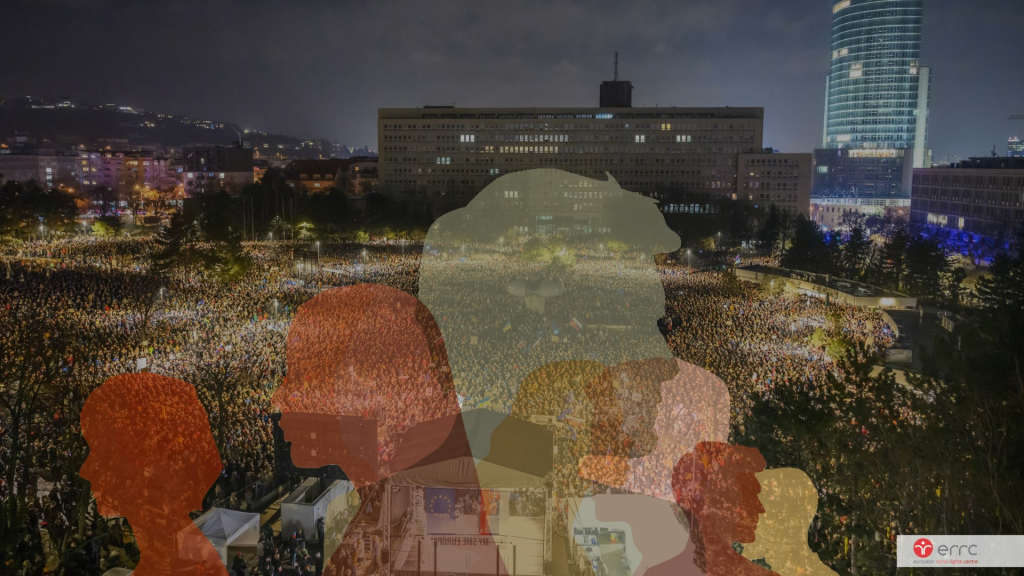Fast-track democratic backsliding in Slovakia: bad for all, but worse for Roma
28 January 2025

The massive anti-government street protests across Slovakia have unnerved Prime Minister Robert Fico. Not least because they coincide with hundreds of thousands of pro-democracy demonstrators taking to the streets of Tbilisi, Belgrade and beyond.
But the fourth-time ’round PM won’t be easily budged. Until the day that democrats prevail inside this increasingly rogue EU member state, the damage done by corrupt and authoritarian rule will continue to run even deeper. This bodes ill for Slovakia’s Roma, for the SMER party’s politics of fear and strategies of tension are polarising society, and will further postpone any national reckoning with racial injustice.
On the eve of mass pro-EU protests which saw tens of thousands take to the streets in 20 cities across Slovakia over last weekend, Prime Minister Robert Fico called an emergency Security Council meeting to address an alleged ‘organised escalation’ of domestic tensions, financed and directed from abroad.
Fico claimed the ongoing unrest is an attempt to organise a coup, and that the intelligence services had uncovered “serious information regarding a long-term organised influence operation with the aim of destabilising Slovakia.” He later told a news conference the opposition was "preparing to occupy government buildings, prevent the execution of government power, cooperate with abroad".
The massive turn-out by Slovak protestors showed that fear wasn’t working, but Fico’s refusal to contemplate early elections means more turbulent times lie ahead, and signal that there will be no let-up in his fast-track democratic backsliding. Since Fico took office in October 2023, promising “a sovereign Slovak voice from Slovak ministries and sovereign Slovak foreign policy”, democracy has faced what Freedom House described as “a grave and sweeping assault from his government, ranging from the subversion of the judicial system to the silencing of media and civil society.”
Promoting effective social inclusion requires good governance and transparency; combating racism requires a commitment to justice and the rule of law. Arbitrary, authoritarian misrule corrodes public trust, makes for chaotic governance, and exacerbates societal tensions. It’s good for nobody, but way worse for rights-deprived Romani communities, excluded, impoverished and already on the margins.
‘The prevalence of racial discrimination’
The extent to which Roma remain marginalised was highlighted by the Council of Europe Commissioner for Human Rights Michael O’Flaherty on his visit to Slovakia in July 2024 – where amidst “an atmosphere of declining tolerance of diverse viewpoints” – he observed in some locations he visited, a chronic lack access to water, sanitation and electricity: “Some Roma dwellings are totally unfit for human habitation and located in hazardous locations, at risk of flooding or near toxic waste dumps. Ambulance services are reported to sometimes avoid Roma settlements even in emergency situations. In some of the areas I visited, standing up for the human rights of Roma is literally a matter of life and death.”
In its 2023 conclusions, the European Committee of Social Rights deemed that the housing situation for Roma is not in conformity with Article 16 of the Charter. The committee noted the failure of the authorities to provide any detailed information requested on evictions, housing support, access to clean water and sanitation, or living conditions and numbers of Romani families living in settlements amounted to a breach of Slovakia’s reporting obligations. Taking account of the information provided by the Slovak National Centre for Human Rights, the Committee found “that the protection of Roma families with respect to housing, including in terms of eviction conditions, is inadequate.”
In its 2022 conclusions on Slovakia, the UN Committee against Racism and Discrimination (UNCERD) remained concerned about the prevalence of racial discrimination; verbal and physical attacks against Roma and other minorities; persistent structural discrimination against Roma; and reports of racial profiling and racially motivated excessive use of force by the police against Roma.
The committee reiterated its call on the authorities to “remove all obstacles that prevent their enjoyment of economic, social and cultural rights”; take all necessary steps to guarantee that all victims of racial discrimination have access to effective and prompts legal remedies; and take measures to address ethnic profiling. As regards racially-motivated police violence, the committee called on Slovakia to “establish an adequately resourced and fully independent monitoring mechanism responsible for investigating complaints.”
The need for a national reckoning with racial injustice
At the best of times, the to-do list of recommendations and necessary measures to combat anti-Roma racism and segregation, after decades of stalling, would be daunting because, as Commissioner O’Flaherty put it, “prejudice against Roma is deeply rooted in society. Discrimination affects all areas of Roma people’s lives in the Slovak Republic.”
The basic requisites for structural reforms to dismantle racism are missing – respect for the rule of law and democratic governance, the political will to marshal the resources to do the right thing, and a commitment to substantive justice for Roma.
This could be the worst of times – whatever the outcome of the current legitimation crisis, as far as the Roma of Slovakia are concerned, the dawning of the day that brings a national reckoning with racial injustice seems even more remote than ever. But it ain’t necessarily so: hope resides with civil society activists and their capacity to resist attacks on democracy. However, democracy’s defenders need to embrace a more profound vision of justice beyond dislodging Fico, and realise that for a better, more inclusive Slovakia, it’s not enough to be non-racist, for now is the time for anti-racist action and solidarity with their Romani fellow-citizens.




